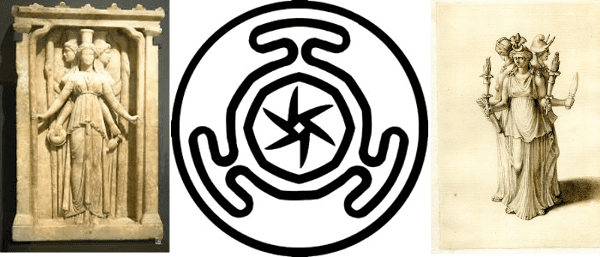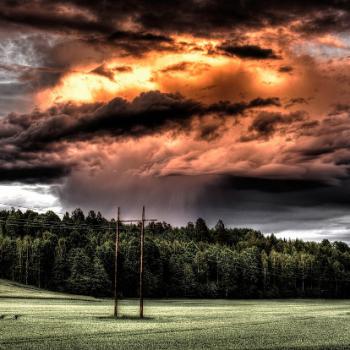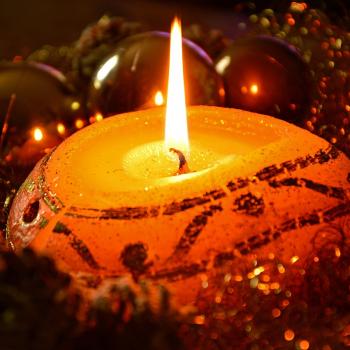
A lot of excellent writers here have written about the Greek goddess Hekate, and I have hesitated writing about her as a result for fear of repeating what has already been said. But given my background of Hellenic polytheism and my academic leanings from that front, I feel like I could offer a unique perspective, balanced between personal gnosis and research. I’ve also written at least one post about the other gods most commonly honored in my life: Apollo, Dionysos, and Hermes–and even other goddesses who come up naturally given their importance in Hellenism such as Hestia. Given how much space Hekate has taken up in in my magical and spiritual practice, it’s only fair that I give the goddess her proper due.
But first, a bit about Hekate. Hekate is a goddess associated with the crossroads, liminal spaces, magic and witchcraft, working with the dead in regards to both spirit and magical work, the dead in general, and both the night and moon.
Hekate is honored monthly in the Athenian calendar in what is often referred to as “Hekate’s supper” or “Hekate’s deipnon“, deipnon referring the largest and/or evening meal in Greek. This occurred on the night of the new moon. In a lot of modern traditions including Hellenism, this ritual has been adopted into people’s personal practices. Typically it consisted of one or more of the following: eggs, cake, garlic, leeks, and/or fish. These were also common offerings for the dead. Hekate is not only associated with the dead but also the “restless dead”, and the supper traditionally was supposed to both honor her and placate the dead. These supper offerings were traditionally left at a crossroads, typically a three way one. Athenians typically didn’t leave their homes during the new moon because it was believed the dead were especially roaming the area during that time. Hellenion has an excellent page on the holiday here. Interestingly, this would indicate that new moons were the ancient Athenian version of Samhain in modern neo- paganismand related traditions. This would be the time when the veils between the realm of the living and the dead were at their thinnest.
Like Hermes and Hestia, Hekate is seen as an intermediary deity, mediating between the living and the dead, witches and magic–particularly magic associated with herbs (especially poisonous ones) and magic involving the dead. Hekate is associated both with Kirke (commonly transliterated as Circe) and Medea, Kirke who was an enchantress most popularly associated with the tale in the Odyssey and Medea, who was a priestess of Hekate and gained her magical powers from her. How both Medea and Kirke were actually related to Hekate varied according to tradition and tale. Some say offspring, others said that Kirke was Medea’s niece.
I came to Hekate after having been involved with both magic and Hellenism for quite a while, and having served as a priestess of Persephone for a festival cycle which belongs to one of my traditions, and what we refer to as the “provider cycle“. It has aptly been compared to the “topside version of the Eleusinian Mysteries” coupled with the mysteries of the Corn Maiden and the Harvest Lord, love and sex, life and death, and the cycle of life, sacrifice and death, and rebirth. Having been the Corn Maiden/Priestess of Persephone from the Spring Equinox to the Fall Equinox and then for Samhain, towards the last month or two I kept getting a strong feeling that I needed to do some serious work with and for the goddess Hekate. Given that she was the attendant/guide of Persephone and as both goddesses are associated with death and the underworld–not to mention one of the chief goddesses of the Eleusinian Mysteries–this made a great deal of sense.
Given what I had heard of the goddess from other polytheists and practitioners–not to mention my research–I thought it would be wisest to not assume but approach her directly in an offering rite. I told Hekate that I was interested in both learning from her and honoring her, but that it was ultimately up to the goddess if she was interested in the same. If not, she was more than free to refer me to another deity, otherwise I was more than willing to put forth the necessary work and effort required. The “response” I got was to read Jason Miller’s Protection and Reversal Magick, and to remember her always in my magical rites.
I got the book, skimmed through it, saw that Hekate played a VERY large role within it, and immediately signed up for Jason’s Sorcery of Hekate course, then after the sequel to it called Hekat2. Its arcana has been invaluable for both my magical and spiritual practices, and I am indebted to Hekate for her immense support, guidance, and blessings in my life. I refer to her now as a tutelary deity of mine, one whom I am beyond grateful to have. For those who are interested in looking into that course, the next cycle starts tomorrow, June 5, 2018.
As a goddess of illumination (Phophoros), savior (Soteira), and the mysteries, it would be extremely difficult in my opinion to imagine being involved in both Hellenism and magic and not at some point paying tribute in regular practices to Hekate. While any deity could conceivably be a part of those works in some variant or another–Apollo for oracular and divinatory work, for instance, which is arguably magical–Hekate is the one deity among the Greek gods most strongly associated with such practices. While there are other gods to be sure, each of them with their own cults and traditions, Hekate being such a strong intermediary deity for such works should at least be remembered once a month on her feast day if nothing else.
You can find more information on Hekate on my reading list, and on Theoi.com.
















